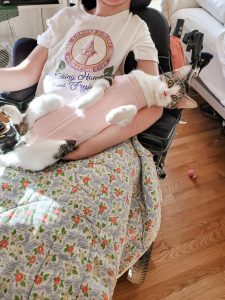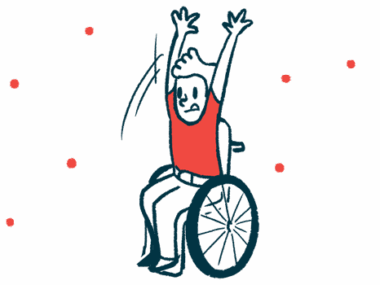When It Rains, It Pours
Written by |

We all know the saying. It can never just sprinkle. It can never just be a gentle spring rain, with sprouting blades of grass and birds twittering about new beginnings.
It’s either drought or deluge. There’s no in between.
We’ve all had moments of absolute absurdity. Days when everything that could go wrong does, in fact, go wrong, leaving you winded, grumpy, and a little bit in awe of your bad luck. It happens to everyone, but disabled folks are particularly susceptible to rainstorms, I think because we’re so dependent on other people. Our lives are complex ecological systems, inextricable from the microsystems and mesosystems and exosystems that comprise our daily living environments.
If you’re reading this column, you probably know what I mean. It’s not just “my caregiver had a rough night’s sleep, which affects my morning routine.” It’s “my caregiver’s neighbor’s distant relative tested positive for COVID-19, but my caregiver’s neighbor didn’t know that when my caregiver paid her a socially distant visit the other day, so now my caregiver is in quarantine until she gets her test results, which means no laundry, no errands, no last-minute stops at CVS to pick up prescriptions.”
Enter the snowball effect. No allergy medication means nasal congestion and sinus headaches and the emotional toll of chronic pain. Chronic pain means low energy means days spent scrolling social media, kicking myself for not being productive, for not completing every last thing on my to-do list. Kicking myself for being “lazy” (read: listening to my body and refusing to work beyond my personal limits) means anxiety, means feeling like a waste of space, means waking up the next morning with the intention of making up for yesterday, only to fail because I’m still burned out because I haven’t truly rested.
But it’s never just a gentle spring rain, remember? When it rains, it pours. My cat went into heat not too long ago and needed to get fixed. Her operation? Another stressor. (The responsibility of caregiving, the financial burden of vet bills, and the lowercase “t” trauma of losing your last cat to a freak accident during surgery.) Not to mention the guilt of having your dad administer your cat’s antibiotics because you can’t physically do it yourself. Not to mention scheduling and transportation and checking the wound to make sure the stitches are intact — stressor, stressor, stressor.
My parents are in the process of renovating their dream home in Wisconsin. A First World problem, for sure, but still a stressor. Every Monday, Wednesday, and Friday, my dad drives to Wisconsin to work on the property. It doesn’t sound like a lot, but again, snowball effect — my mom works 10-hour days, if not more, and has to cook and feed me dinner when he’s gone. My dad comes home sweaty and exhausted, but has another two to three hours of work ahead of him before he can sleep, between getting me ready and putting me to bed. With Dad gone, there are things that simply don’t get done, things that caregivers would do if COVID-19 hadn’t changed the world.
When it rains, it pours.
Then there’s the mysterious rash that showed up a few weeks ago. At first, I thought it was “maskne.” But then it started to itch and burn. It wasn’t responding to the dozens of over-the-counter medications we have lying around the house, so I scheduled a virtual appointment. The topical antibiotic I was prescribed helped with the itch, but after a week of consistent application, the rash spread to my eyelid. My face is swollen and red now, puffy to the point of deformation. I can’t wash my face without pain. And I certainly can’t record videos for SMA My Way with what looks like a black eye.
Oh, and I can’t forget that my primary care provider has been out of the office for over a year. She was supposed to be back sometime this month, but I recently got a phone call from the clinic saying she won’t be back until May of next year. Snowball effect: No primary care provider means no trust between clinician and patient means no one to fill out forms, refill prescriptions, determine if my antidepressant has actually had a positive impact on my mood.
Then there’s the global pandemic and the once-in-a-lifetime presidential election in the U.S., and the DNA test required by my neurologist, and the absolutely ridiculous undertaking that is writing and revising and trying to publish a book …
When it rains, it pours.
Which isn’t to say that I’m alone in my stress. My parents are feeling it. My friends are feeling it. My caregiver, and her sweet, apples-of-my-eye daughters are feeling it. But disabled folks experience a unique kind of stress, because things are so often out of our control. I’m at the mercy of all the people in my life. It’s not their fault — not by any means — but it’s easy to see how one thing leads to another leads to thunderclaps and lightning strikes.
***
Note: SMA News Today is strictly a news and information website about the disease. It does not provide medical advice, diagnosis, or treatment. This content is not intended to be a substitute for professional medical advice, diagnosis, or treatment. Always seek the advice of your physician or other qualified health provider with any questions you may have regarding a medical condition. Never disregard professional medical advice or delay in seeking it because of something you have read on this website. The opinions expressed in this column are not those of SMA News Today, or its parent company, Bionews, and are intended to spark discussion about issues pertaining to spinal muscular atrophy.





Leave a comment
Fill in the required fields to post. Your email address will not be published.